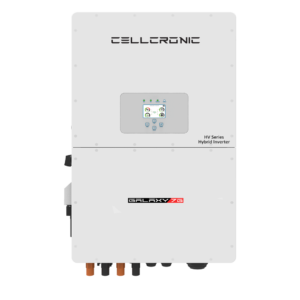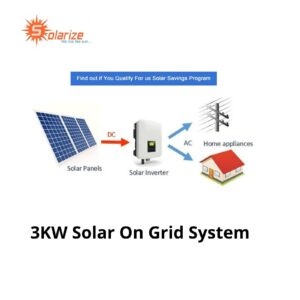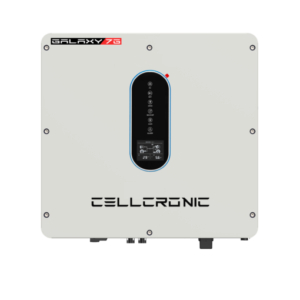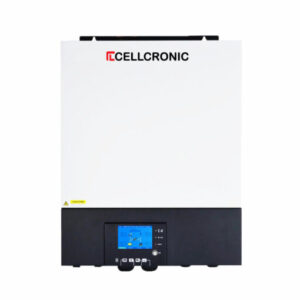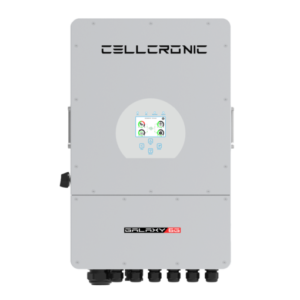Solar Inverters
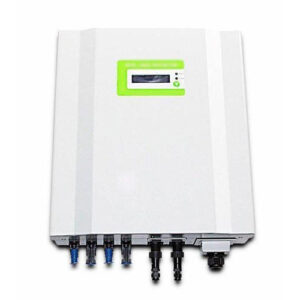 Solarize, India’s No.1 Solar Company has powered 50,000 homes in remote and hilly areas, showcasing the potential of solar inverters in providing sustainable energy solutions. With 5 years of trusted product innovation, distribution, and service, solar inverters have become an essential component of the renewable energy landscape. Instant customer service through various channels is available for those interested in adopting solar inverters for their homes or businesses.
Solarize, India’s No.1 Solar Company has powered 50,000 homes in remote and hilly areas, showcasing the potential of solar inverters in providing sustainable energy solutions. With 5 years of trusted product innovation, distribution, and service, solar inverters have become an essential component of the renewable energy landscape. Instant customer service through various channels is available for those interested in adopting solar inverters for their homes or businesses.
As the demand for cleaner and more efficient energy sources continues to grow, solar inverters have emerged as a key player in the transition towards green energy. In this comprehensive guide, we will take you through the different types of solar inverters, their benefits, installation and maintenance processes, and factors to consider when choosing the right solar inverter for your needs.
Key Takeaways:
- Solar inverters are crucial in providing sustainable energy solutions for remote and hilly areas.
- They have become an essential component of the renewable energy landscape.
- Solar inverters help reduce electricity bills and contribute to a greener environment.
- Proper installation and maintenance are important for optimal performance.
- Choosing the right solar inverter involves considering factors such as solar inverter price, power output, and efficiency.
The Different Types of Solar Inverters
When it comes to harnessing the power of solar energy, there are several types of solar inverters that play a crucial role. Solar inverters are responsible for converting the direct current (DC) generated by solar panels into usable alternating current (AC) that can power our homes and businesses. Understanding the different types of solar inverters is essential for choosing the right one to meet your specific needs and requirements.
On Grid Inverters
On-grid Solar inverters, also known as grid-tied or grid-connected inverters, are the most common type found in residential and commercial installations. These inverters are designed to work in conjunction with the electrical grid, feeding excess solar energy back into the grid. This not only reduces your reliance on traditional energy sources but can also earn you credits through feed-in tariffs. They are a great choice if you live in an area with a reliable grid connection and want to offset your electricity consumption.
Off-Grid Inverters
Off-grid solar inverters, as the name suggests, are used in standalone solar systems that are not connected to the utility grid. These inverters are commonly found in remote areas where access to the grid is limited or non-existent. Off-grid systems typically require batteries to store excess solar energy for use during times when the sun is not shining. Off-grid inverters are ideal for those seeking complete energy independence and are willing to invest in a comprehensive off-grid system.
Hybrid Solar Inverters
Hybrid solar inverters offer the best of both worlds by providing the flexibility to operate in both on-grid and off-grid modes. These inverters are capable of seamlessly switching between grid-connected and standalone modes, depending on the availability of solar energy and the state of the grid. Hybrid inverters are becoming increasingly popular as they offer users the ability to maximize their energy independence while still having the option to rely on the grid when needed.
The Benefits of Solar Inverters
Solar inverters offer numerous benefits for consumers in their pursuit of clean and sustainable energy solutions. By harnessing the power of the sun, solar inverters contribute to a greener environment and help reduce carbon emissions. Let’s explore some of the key a solar inverter benefits:
1. Reduced Electricity Bills:
One of the primary benefits of solar inverters is the potential to significantly reduce electricity bills. By utilizing solar energy, homeowners and businesses can generate their own power, thereby decreasing their reliance on traditional grid-based electricity. This allows them to offset their consumption and save money in the long run.
2. Environmental Impact:
Solar inverters play a crucial role in promoting a greener environment. By generating electricity from renewable solar energy, they help reduce carbon emissions and mitigate climate change. With increasing awareness of environmental sustainability, solar inverters have become an attractive solution for those looking to make a positive impact.
3. Backup Power and Energy Independence:
Solar inverters enable users to have backup power during grid outages. By storing excess energy in batteries, solar inverters provide a reliable source of electricity even when the grid fails. This level of energy independence gives users peace of mind knowing that they have a backup power solution readily available.
4. Long-Term Reliability:
Many solar inverter manufacturers offer warranty options and maintenance support, ensuring long-term reliability for consumers. With proper installation and regular maintenance, solar inverters can provide years of efficient and uninterrupted operation. This reliability factor makes solar inverters a smart investment for those considering a switch to renewable energy.
By embracing solar inverters, individuals and businesses can enjoy the multiple benefits of reducing electricity bills, supporting a greener environment, gaining backup power, and ensuring long-term reliability. Solar energy is paving the way for a sustainable future, and solar inverters play a crucial role in harnessing its potential.

Installation and Maintenance of Solar Inverters
Proper installation and maintenance of solar inverters are critical for ensuring optimal performance and longevity. When it comes to solar inverter installation, it is highly recommended to hire a professional solar installer with expertise in designing and setting up solar systems. The installer will assess the site conditions, including the roof structure, shading, and orientation, to determine the best placement for the solar panels and inverters.
During the installation process, the solar inverter will be connected to the electrical system of your home or business. This involves wiring and configuring the inverter to ensure seamless integration with the existing electrical infrastructure. It is important to follow all safety guidelines and regulations to ensure a safe and compliant installation.
Maintenance of solar inverters primarily involves regular cleaning and inspection. Dust, dirt, and debris can accumulate on the solar panels over time, reducing their efficiency. Cleaning the panels periodically with water and a soft brush can help maximize their performance. Additionally, it is important to regularly check for any faults or errors displayed on the inverter’s monitoring system. Some manufacturers may offer remote monitoring capabilities, allowing you to track the performance of your solar system and detect any potential issues.
In case of any technical problems or concerns, it is advisable to contact the manufacturer or a qualified solar service provider. They can diagnose and resolve any issues with the solar inverter promptly, ensuring that your system continues to generate clean and sustainable energy.
Table: Solar Inverter Installation Checklist
| Installation Steps | Details |
|---|---|
| Evaluate Site Conditions | Assess roof structure, shading, and orientation |
| Design System | Create a customized solar system design |
| Obtain Necessary Permits | Ensure compliance with local regulations |
| Install Solar Panels | Mount and wire the solar panels |
| Connect Inverter | Wire and configure the solar inverter |
| Integrate with Electrical System | Connect the inverter to the electrical infrastructure |
| Test and Commission | Ensure proper functioning of the solar system |
By following these installation and maintenance guidelines, you can enjoy the maximum benefits of your solar inverter system. Remember to engage the services of qualified professionals and perform regular maintenance to keep your solar inverter operating at its best.
Comparing Solar Inverter Types: On-grid vs. Off-grid vs. Hybrid
When it comes to choosing a solar inverter, understanding the different types available is essential. This section will compare the three main types: on-grid, off-grid, and hybrid inverters, highlighting their unique features and benefits. Whether you want to offset your electricity consumption, achieve complete independence from the grid, or enjoy the flexibility of both options, this comparison will help you make an informed decision.
On-grid Inverters
- Connected to the electrical grid
- Feed excess energy back into the grid
- Ideal for offsetting electricity consumption
- Potential to earn money through feed-in tariffs
- Does not provide power during grid outages
Off-grid Inverters
- Used in standalone systems with no grid connection
- Provides complete independence from the grid
- Great for remote areas or locations with unreliable grid access
- Requires battery storage to store excess energy
- Provides backup power during grid outages
Hybrid Inverters
- Provides the flexibility of both on-grid and off-grid operations
- Can switch between grid-connected mode and standalone mode
- Offers the benefits of both on-grid and off-grid inverters
- Requires battery storage for off-grid functionality
- Provides backup power during grid outages
When choosing a solar inverter, it’s important to evaluate your specific needs and requirements. If you want to reduce your electricity bills and potentially earn money through feed-in tariffs, an on-grid inverter is a suitable option. For those seeking complete independence from the grid, an off-grid inverter is the way to go. Hybrid inverters offer the flexibility to switch between both options, providing the best of both worlds. Consider your location, energy consumption, and budget before selecting the most suitable solar inverter for your needs.
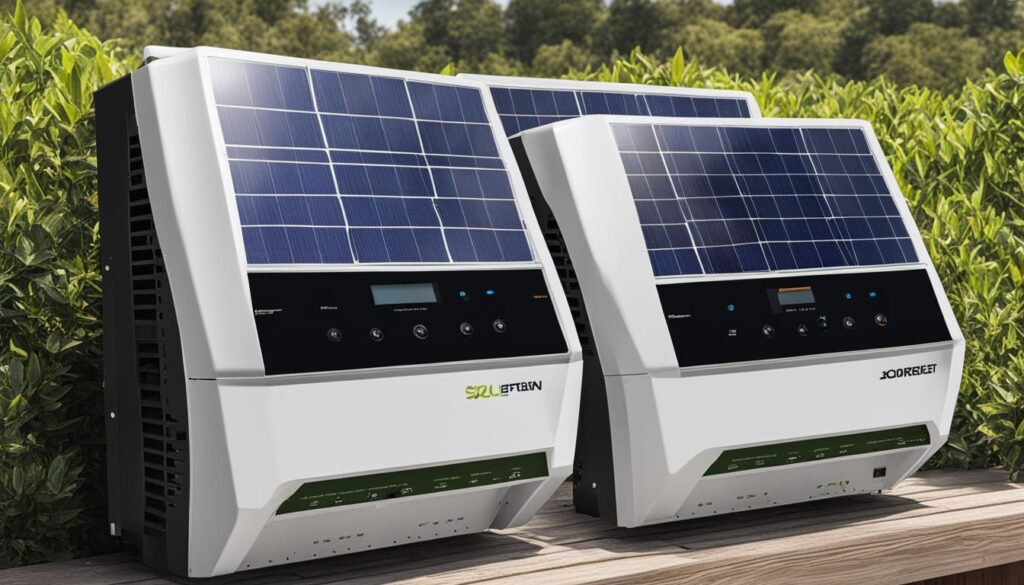
| Features | On-grid | Off-grid | Hybrid |
|---|---|---|---|
| Grid Connection | Connected | No connection | Switchable |
| Excess Energy | Feeds back into the grid | Requires battery storage | Feeds back into the grid and requires battery storage |
| Power during Grid Outages | No power | Provides backup power | Provides backup power |
| Independence from the Grid | No | Yes | Switchable |
| Flexibility | No | No | Switchable |
Factors to Consider: Choosing the Right Solar Inverter
When it comes to choosing the right solar inverter for your needs, there are several factors to consider. The price is an essential consideration, as it determines the affordability and potential return on investment. It’s important to compare the prices of different solar inverters in the market to find one that suits your budget without compromising on quality.
In addition to price, the power output and efficiency ratings of the solar inverter should be evaluated. Higher power output ensures that your solar system can generate enough electricity to meet your energy needs. Similarly, a higher efficiency rating means that the inverter can convert a larger percentage of the sunlight it receives into usable energy, maximizing your solar system’s performance.
Warranty periods are also crucial to consider when choosing a solar inverter. Longer warranties provide peace of mind and protection against potential defects or malfunctions. It’s important to understand the warranty terms and conditions, including any limitations or exclusions, to make an informed decision.
Comparing Solar Inverter Types
Before finalizing your decision, it’s crucial to compare solar inverter types available in the market. On-grid inverters, which are connected to the electrical grid, allow you to sell excess energy back to the grid. Off-grid inverters, on the other hand, are suitable for standalone systems where there is no grid connection. Hybrid inverters offer the flexibility to switch between on-grid and off-grid operations, providing the best of both worlds.
| Type of Solar Inverter | Key Features |
|---|---|
| On-grid Inverters | – Connected to the electrical grid\n- Can sell excess energy back to the grid\n- Ideal for offsetting electricity consumption |
| Off-grid Inverters | – Used in standalone systems\n- No connection to the grid\n- Suitable for remote areas or complete independence from the grid |
| Hybrid Inverters | – Capable of both on-grid and off-grid operations\n- Flexibility in energy usage\n- Ideal for users who want reliability and adaptability |
By considering the factors mentioned above and comparing the different types of solar inverters, you can make an informed decision that aligns with your energy needs, budget, and sustainability goals.
Harnessing Solar Power with Inverters for a Sustainable Future
Solar inverters have emerged as a crucial component in harnessing solar power and paving the way for a sustainable future in India. By adopting solar inverters, individuals and businesses can contribute to reducing their carbon footprint and dependence on fossil fuels, while embracing clean and renewable energy sources.
The use of solar power inverters not only helps in reducing electricity bills but also promotes sustainable living. By utilizing solar energy, users can significantly decrease their reliance on the traditional electrical grid, thereby minimizing the environmental impact caused by conventional energy sources. This transition to solar power contributes to a greener and healthier ecosystem.
India, with its abundant sunlight, is ideally positioned to embrace solar power and make it an integral part of its energy landscape. The increasing affordability and advancements in solar technology have made it possible for a wider population to access quality solar inverters, making sustainable living a viable and achievable goal.
Investing in solar power inverters is not just a responsible choice for individuals and businesses but also a significant step towards building a greener and more sustainable future. By embracing solar energy and supporting the use of solar inverters, we can collectively work towards a cleaner and healthier India, ensuring a sustainable future for generations to come.
Showing all 9 results

